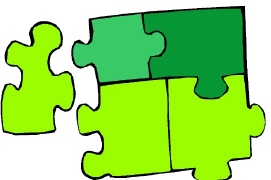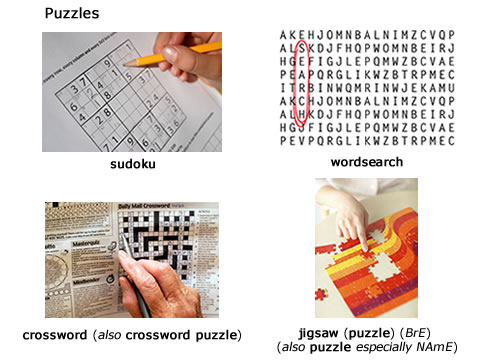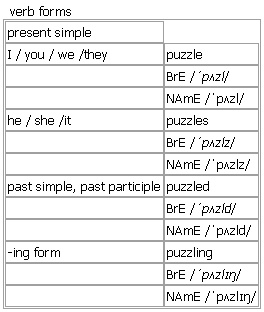|
Từ điển Oxford Advanced Learner 8th
 puzzle
puzzle

puz·zle [puzzle puzzles puzzled puzzling] noun, verb BrE [ˈpʌzl] NAmE [ˈpʌzl]
noun 
1. a game, etc. that you have to think about carefully in order to answer it or do it
•a crossword puzzle
•a book of puzzles for children
2. (especially NAmE) = ↑jigsaw
3. usually singular something that is difficult to understand or explain
Syn: ↑mystery
•The deeper meaning of the poem remains a puzzle.
•The detectives were beginning to solve the murder. All the pieces in the puzzle were falling neatly into place.
Word Origin:
late 16th cent. (as a verb): of unknown origin.
Culture:
crosswords
Crosswords, or crossword puzzles, first appeared in the US in the early 20th century. Today, many people in the US and in Britain regularly do crosswords, sometimes on the bus or train on their way to work. Most newspapers and magazines contain at least one crossword and there are often prizes for people who send in the correct solution. Books of crosswords are also popular.
Solving a crossword involves answering a set of clues. The answers are words or phrases which fit together in a patterned grid. The clues are usually numbered and listed as across and down, according to whether the answer reads across the grid or from top to bottom.
There are two basic types of crossword, called in Britain quick crosswords and cryptic crosswords. In quick crosswords the clues are usually definitions of the answers. This is much the most common type of crossword in the US, where the grids are usually a lot bigger and contain many more words. These crosswords are not necessarily easy, and the one in the Sunday issue of the ↑New York Times is considered very difficult.
Cryptic crosswords, which began in Britain and are much more popular there than in any other country, have clues which contain both a definition of the answer and a word puzzle involving the letters in it. One common type of word puzzle is an anagram, in which the letters of the answer word are rearranged in the clue to form another word or phrase. For example, CARTHORSE and SHORT RACE are both anagrams of the word ORCHESTRA.
Example Bank:
•The origin of the word is something of a puzzle.
•The police didn't know what the message meant, but it was another piece in the puzzle.
•The puzzle remains of what happened to the ship.
•There is a puzzle about how the plant first came to Britain.
•They knew who the killer was, but there were still some gaps in the puzzle.
•They're trying to solve the puzzle of how gravity works.
•Traces of explosives found among the wreckage were the key to the puzzle.
Derived Word: ↑puzzling
Derived: ↑puzzle over something ▪ ↑puzzle something out
verb ~ sb
to make sb feel confused because they do not understand sth
Syn: ↑baffle
•What puzzles me is why he left the country without telling anyone.
Verb forms: 
Word Origin:
late 16th cent. (as a verb): of unknown origin.
Example Bank:
•I had noticed something puzzling.
•Marlowe was a puzzling character.
•There were reports of the puzzling deaths of hundreds of dolphins.
Example Bank:
•This is something that has always puzzled me greatly.
•How they recognized you is what puzzles me.
•It has always puzzled me that he hasn't won more tournaments.
•This question has puzzled scientists for decades.
•What puzzles me is why he left without telling anyone.
|
|
|
▼ Từ liên quan / Related words
Related search result for "puzzle"
|
|
